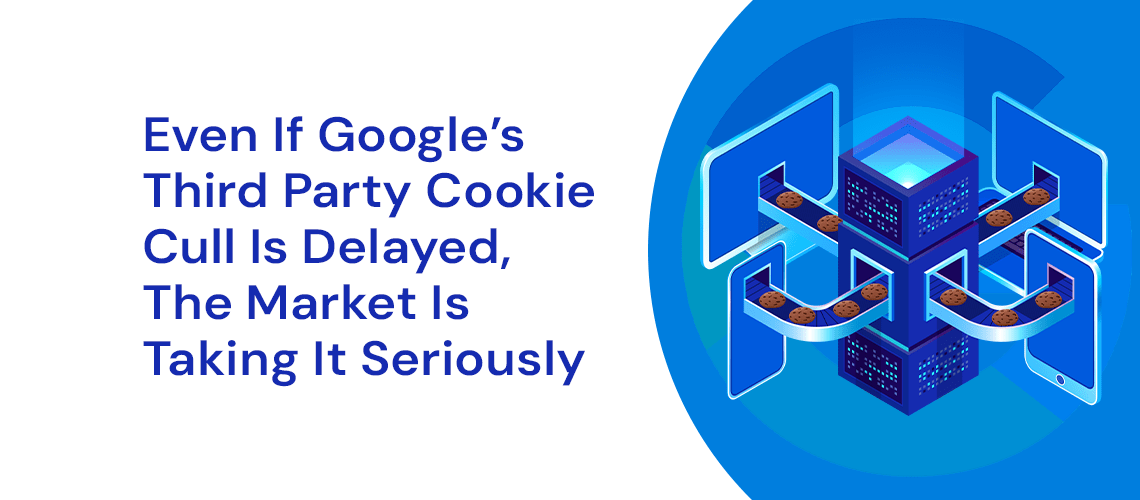Google’s plan to cull third party cookies in Chrome before the end of this year met with a fresh hurdle last month – at least according to a glut of trade press articles.
Firstly, the UK’s Competition and Markets Authority – which is leading the charge and running the regulatory rule on Google’s plans to deprecate and replace the internet’s tracking and targeting currency – said Google wouldn’t be hitting the off switch without its say so and “until our concerns are addressed”.
In brief, the UK competition regulator’s unease includes interoperability concerns and fears that Google’s cookie replacements may well reinforce its own market dominance. Plus questions around how Google will resist using its vast first party data and majority ownership of digital advertising’s pipes and wires to favor its own $238B ad business rather than operate the Privacy Sandbox in the broader industry’s best interests.
Within days of the CMA’s quarterly report landing, the IAB Tech Lab immediately fired off its own weighty list of complaints via a 100-plus page tome – covering everything from its fears of anti-competitive outcomes, lack of transparency and standardization, the ability (or lack thereof) for third party audits and some serious questions about the impact of moving much of the auction process into the browser. Plus a long list of technical questions to keep the average adtech nerd debating the topic until the CMA’s next quarterly report in April.
(See IAB Tech Lab’s full list of gripes here and Google’s response – in short, “the analysis contains many misunderstandings and inaccuracies” – here).
In truth, the Competition and Markets Authority (CMA) was always going to have the final say on whether Google can push ahead with the phase out beyond its current 1 per cent trial – circa 30 million browsers – subject to its concerns being met.
As things stand, the test will run until the second quarter, at which point there will be a standstill period of no less than 60 days after Google tells the CMA it intends to press ahead with the cookie cull.
The CMA can then ask Google to extend that to 120 days while it runs the rule over latest Privacy Sandbox developments and their impacts. That could take things up until the start of Q4.
If the CMA still has competition law concerns and isn’t happy with Google’s proposed fixes (don’t bet against it), then it can apply to the courts to take action under the Competition Act, i.e. shut everything down via the law, if Google tries to force the issue.
On the other hand, if the CMA is satisfied with Google’s proposals and commitments – and to date it says Google has acted in good faith, “and is engaging with us to resolve our remaining concerns ahead of cookie deprecation” – then Google can start shutting off cookies for the rest of the web. And then the fun really starts.
That’s still a relatively big if. But after years of delay, false starts, billions of dollars invested and thousands of engineers committed to finding a workable and privacy-compliant solution, Google is committed. While its most outspoken competitors suggest Google’s alternative is “primitive” and amounts to “the covering of Google’s legal ass on privacy”, even they are also committed to testing it. Be prepared and all that.
Contextual Push

Other advertising behemoths are likewise taking no chances. Amazon has struck a deal with Reach, the UK and Ireland’s largest commercial news publisher, to tap its contextual data – i.e. content and keywords instead of cookies – in order to better target shoppers across the publisher’s sites.
The firm’s EU adtech sales chief Frazer Locke told the Financial Times that the end of cookies means “first party contextual signals are critical” in enabling advertisers to target audiences “without sacrificing reach, relevancy or ad performance”.
Amid sustained drops in ad revenues, other publishers will no doubt be hoping to strike similar deals, having previously pinned hopes on a bump in context-based income in 2022 and 2023, Google’s original first and second timetables to remove third party cookies. (Though ad tech firms, including major verification providers, have long been accused of helping themselves to that contextual data by scraping it and packaging it up into segments.)
Whether publishing’s mid to long-tail gets a look in remains to be seen. But news conglomerate Axel Springer recently pushed into contextual video to get ahead of the post-cookie curve while hoping to overcome buyer reticence for seller defined audiences – i.e. lack of transparency on how sellers define their audiences and where their ads appear. In its IPO prospectus, Reddit also said contextual advertising was the future.
Brand safety has long been a major contextual concern, with publishers historically suffering from blunt keyword blocking stacking up over time and crimping their revenues as a result.
Some advertisers for example blocked anything to do with Covid-19 during a rare boom time for news media in 2020-21 – though some suggest AI may soon help clear that hurdle as artificial intelligence tools make faster, lighter work of reading text, picture and video nuance at scale than humans attempting to figure things out piecemeal.
Either way, contextual approaches are just one part of the post-cookie mix – and most viable solutions, at least in the open web, will likely combine some form of consented identifier as advertisers work out how to rebuild their performance marketing toolkits.
Which is where the real innovation is already underway, Google or otherwise.


